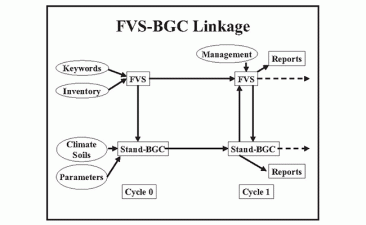Bio-Geochemical Cycles Model
Model Description

Forest Vegetation Simulator Bio-Geochemical Cycles Model (FVS-BGC) is a hybrid model, representing a marriage between the USDA's empirically based Forest Vegetation Simulator (FVS), and Stand-BGC, an atmospheric-driven process model. FVS-BGC operates as an extension to FVS, and as such, provides-in addition to the usual FVS growth and mortality estimates-output describing tree- and stand-level ecophysiology. Unlike its predecessor FOREST-BGC (Running and Coughlan 1988), FVS-BGC simulates biogeochemical processes on individual trees; hence it operates at a spatial scale typical of stand inventories. Furthermore, its linkage with FVS permits the analysis of stand management activities on stand ecophysiology.
Using daily atmospheric data as driving variables, the model simulates-on a daily timestep-carbon and water dynamics via the modeling of photosynthesis, respiration, and evapo-transpiration. On a yearly timestep, accumulated carbon is allocated to plant tissue pools (leaf, stem, roots). The resultant simulated growth is accumulated for every year within each FVS cycle. At the end of each growth cycle, simulated tree dimensions in FVS are updated using either FVS's or BGC's projected growth estimates, as directed by the user. No matter which model's growth estimates are used across cycle boundaries (FVS's or BGC's), the FVS-BGC extension provides extensive output describing the within-cycle ecophysiology, including estimates of: 1) daily and yearly rates of photosynthesis, respiration, turnover, and transpiration; 2) amount of carbon allocated to each tree record's leaf, stem, and root pools, (including the resultant new dimensions); and 3) leaf areas and crown dimensions of each tree record. Such information may be used to analyze the physiology of trees and forest stands under different hypothesized atmospheric and/or management scenarios.
This extension is currently available for evaluation purposes with the North Idaho and Central Rockies variants.
Documentation & References
Running, S.W. and Coughlan, J.C. 1988. A general model of forest ecosystem processes for regional applications: I. Hydrologic balance, canopy gas exchange and primary production processes. Ecological Modelling 42: 125-154.
FVS-BGC: User’s Guide to Version 1.1 FHTET-2002-02 (356 KB PDF)
Keyword Guide
Included in documentation.
